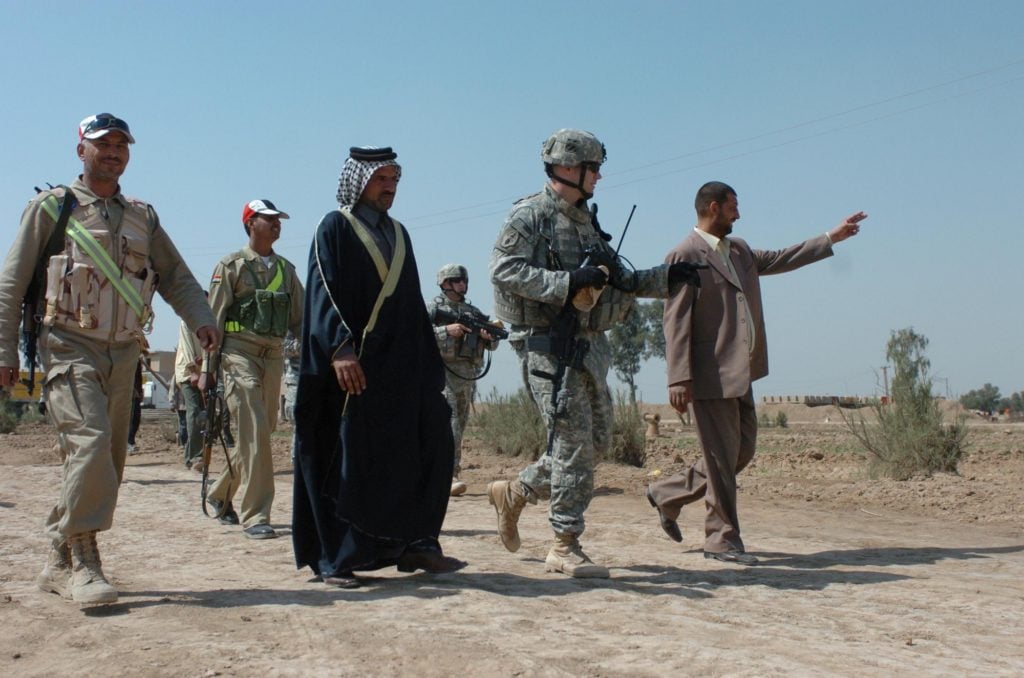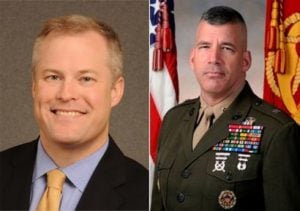
Sunni tribal fighters in 2007 (Photo Credit: U.S. Army)
For several weeks in late 2004, U.S. Marines pushed their way through Fallujah, fighting street-by-street, house-by-house, room-by-room. In that desert city, on the banks of a polluted Euphrates River, they experienced some of the heaviest urban combat the Corps had seen since the Battle of Hue City, Vietnam, in 1968.
The second battle to retake Fallujah, code-named Operation Phantom Fury, eventually secured the longstanding Sunni stronghold, 35 miles west of Baghdad. But a low-intensity warfare campaign against insurgent forces continued, preventing the conditions for Iraqi government control.

In mid-2007, Daniel Green, now a Defense Fellow at The Washington Institute for Near East Policy, was sent to Fallujah as a mobilized U.S. Navy reservist to work as a tribal and leadership engagement officer for a Naval Special Warfare unit. He worked alongside then-Lieutenant Colonel William Mullen III, a Marine infantry officer who served as the battalion commander in charge of the city for most of 2007. Together, Green and Mullen were able to successfully build partnerships with local Iraqis, apply a counter-insurgency strategy to the city, and contribute to routing al Qaeda insurgents by bolstering the city’s security, political, and tribal structures.
In January 2014, however, Fallujah fell again to al Qaeda and affiliated militants, including ISIS.
Paul Nash of the Foreign Policy Association spoke with Dr. Green and Brigadier General Mullen about the current situation in Fallujah and their experience in countering the city’s insurgency nearly eight years ago. That experience is recounted in their book FALLUJAH REDUX: The Anbar Awakening and the Struggle with al-Qaeda, published by the U.S. Naval Institute Press.
[Note: All opinions, interpretations, and analyses expressed in this interview are the interviewees’ own and do not reflect those of the U.S. government, the U.S. Marine Corps, the U.S. Navy, or the U.S. Department of Defense.]
Q: When you left Fallujah, did you ever sense that the city might one day fall again to insurgents as it did last year?
Dr. Green: I felt at the time that al Qaeda had so thoroughly brutalized the Iraqi people that the Sunni Arab population would never again embrace them. I also felt that the idea of politically marginalizing the Sunni Arabs had clearly not worked and that the central government would genuinely try to incorporate them into a viable national government. I think none of us anticipated the Arab Spring and how much the chaos in Syria would allow al Qaeda in Iraq to reconstitute itself.
Brig. Gen. Mullen: I think I knew it was always a possibility. There was a good bit of optimism when we left, but it was also clear that the long-term prospects for the city, and Iraq in general, were entirely up to the Iraqis. When asked whether I thought we won in Iraq in the years immediately after 2007, I replied that we would not know for sure for at least 10 years or more. The key, in my mind, was that they needed a Nelson Mandela-type figure to lead the country to a better future. Instead, they got a Shia party hack.
Q: Based on your experience, what do you think is the key to getting local Iraqis off the fence and turned against the insurgents?
Dr. Green: I believe there needs to be an overarching political rationale for the Sunni Arab population to once again turn against al Qaeda and ISIS. A political program of reconciliation between Iraq’s factions must be real, and it must be enshrined in Iraq’s constitution otherwise it will not be enduring. Additionally, Fallujah was pacified in 2007 by having the Iraqi army, Iraqi police, and the Sunni Arab tribes working together, mentored by U.S. military personnel. The strengths of one compensated for the weakness of another. These forces must work in concert and have their actions synchronized.
Brig. Gen. Mullen: You need to instill a sense of personal security and the feeling that when they do climb down off the fence, they are coming down on the winning side because it is a matter of life and death for them. If they can also feel like they are part of making a difference, that helps.
Q: Does the current situation in Fallujah differ from the one you encountered in 2007?
Dr. Green: My sense is that the residents of the Fallujah area only welcomed ISIS as a temporary measure to exert pressure on Iraq’s central government to not mistreat them and their interests. Local residents have also been coerced by ISIS and suppressed by them. I believe that the Sunni Arab population, at its heart, does not truly support ISIS but is only doing so out of short-term political calculations or because it is unable to turn against them due to intimidation. Any strategy going forward needs to factor these conditions into a comprehensive strategy.
Brig. Gen. Mullen: Since I have not stepped foot in Iraq since late October 2007, it is hard to say. News reports can be inaccurate. It seems that ISIS rolled into town and found a very sympathetic population that felt alienated by actions the Maliki government either took or neglected to take. I think I am also seeing some of the “buyer’s remorse” that Dan and I saw in Fallujah because ISIS is actually worse than al Qaeda was – and that is saying something. Al Qaeda learned from its mistakes in Iraq and sought to avoid them elsewhere. ISIS seems to think that al Qaeda in Iraq was too easy on people and has doubled down. That will not end well for ISIS.
Q: Do you feel ISIS can be confronted using the same strategy that worked so well in 2007? Or does the current situation call for something fundamentally different?
Dr. Green: In many respects, ISIS now operates like a conventional army, and so any solution informed by our experiences in 2007 will have to take that into account. Additionally, the Sunni Arab community has been marginalized twice since U.S. forces initially invaded Iraq. Any effort to convince them to turn against ISIS will need to factor that into any political strategy to integrate them into Iraq’s political structures. Finally, we obviously do not have the same numbers of troops there, so our ability to work with, and through our Iraqi partners is paramount and must be constantly improved.
Brig. Gen. Mullen: I believe it can, and it may work even faster due to how harsh ISIS has been. You do not torture and kill Al-Anbari tribe members without some form of retribution coming back at you. The Sunni piled on the bandwagon in the initial ISIS wave of success, and now that the tide is beginning to recede and ISIS is having fiscal difficulties as well as taking substantial losses, I believe we are once again approaching a tipping point. When the situation tips, the weak-willed will scatter like rats from a sinking ship, and the zealots will probably die very hard deaths at the hands of the people they have been abusing since last fall. The Sunni in Iraq neither forgive nor forget. Neither do the Shia, and they now have mass graves being uncovered in Tikrit to add to their desire for revenge.
Q: Do you think the Iraqi government could have done anything to prevent the emergence of a new insurgency? And is it now handling the situation in the most effective manner?
Dr. Green: I think it is very hard for a society emerging out of the shadows of dictatorship, especially one supported by a minority group, to then become magnanimous toward that same group once the formerly oppressed are now in power. In order for Iraq to go forward, a spirit of magnanimity, political tolerance, and inclusion, as well as a focus on decentralization, must be adopted. These efforts must be closely aligned with a security strategy that is highly synchronized and methodical, and one that brings together military, police, and tribal forces. I believe more efforts must be made to reform Iraq’s central government in order for it to be more inclusive of the Sunni Arabs and to empower local government through greater decentralization.
Brig. Gen. Mullen: I absolutely think more could have been done. And I have said before that if we had a list of things not to do in order to avoid a result like we have today, Maliki has not only done every one of them but has even added a few items of his own. He was the last person on earth who the Iraqis needed as their prime minister. Prime Minister Albadi seems to understand all this, and if he can get a truly inclusive government going – he seems to be off to a solid start – then they can beat ISIS and restore Iraq to some semblance of order.
Q: What role, if any, do you think American forces should play in Fallujah today?
Dr. Green: I believe we should serve as behind-the-scenes catalysts, facilitators, and coordinators of Iraqi efforts to address the underlying political problems of the country. And once progress has been made in this respect, we should work to bolster and empower an integrated security plan to secure the rest of the country.
Brig. Gen. Mullen: I think we should do as little as humanly possible. The Iraqis (both Sunni and Shia together) have to do this, to be seen doing it, and to fully understand that THEY did it together. That would be enormous and would go a long way towards the reconciliation that is needed after 30 years of horrendous Sunni rule under Saddam, and then the years since 2003 of sectarian torture and killings that have gone both ways. The reconciliation model used for Rwanda would be a good start.